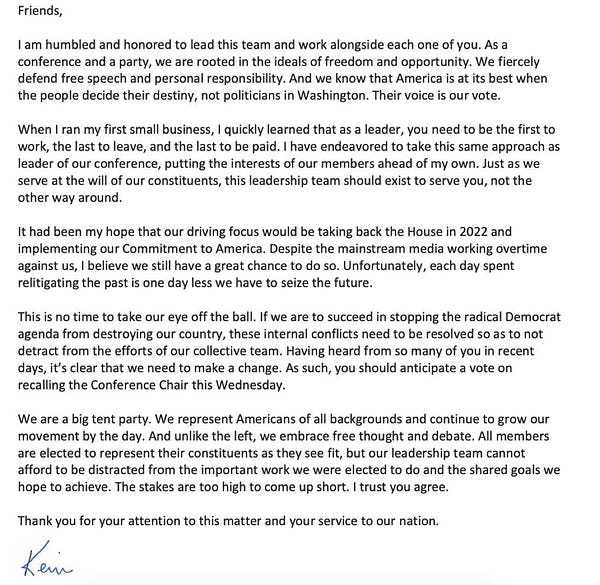https://www.nytimes.com/2021/05/29/climate/fossil-fuel-courts-exxon-shell-chevron.html
Sunday, May 30, 2021
The New York Times: Big Setbacks Propel Oil Giants Toward a ‘Tipping Point’
https://www.nytimes.com/2021/05/29/climate/fossil-fuel-courts-exxon-shell-chevron.html
Futurism: China's "Artificial Sun" Fusion Reactor Just Set a World Record
https://futurism.com/chinas-artificial-sun-fusion-reactor-just-set-a-world-record
Friday, May 28, 2021
Fwd: Wonking Out: The greenback rules. So what?
From: Paul Krugman <nytdirect@nytimes.com>
Date: Fri, May 28, 2021, 11:27 AM
Subject: Wonking Out: The greenback rules. So what?
To: <mbannerman@arcstarenergy.com>
|
Thursday, May 27, 2021
NYTimes: QAnon Now as Popular in U.S. as Some Major Religions, Poll Suggests
mob: +1 305-984-1177
tel: +1 646-402-5076
ClearGen, GreenStruxure announce $500M partnership on renewable microgrids | Utility Dive
mob: +1 305-984-1177
tel: +1 646-402-5076
California mulls 11.5 GW procurement package to bolster grid after Diablo Canyon, natural gas plants retire | Utility Dive - see tail end of fossil procurement in CA
mob: +1 305-984-1177
tel: +1 646-402-5076
Monday, May 24, 2021
Fwd: May 24, 2021
mob: +1 305-984-1177
tel: +1 646-402-5076
From: Heather Cox Richardson from Letters from an American <heathercoxrichardson@substack.com>
Date: Mon, May 24, 2021, 11:39 PM
Subject: May 24, 2021
To: <mbannerman@tnag.net>
On Sunday, President Alexander Lukashenko of Belarus forced a commercial airliner, operated by Ryanair, flying from Athens, Greece, to Vilnius, Lithuania, out of the sky as it passed through the airspace over Belarus. A MiG-29 fighter jet diverted the plane to Minsk, the capital of Belarus, after ground support warned its pilots (falsely) there was a bomb on board. There wasn't a bomb on the plane; there was an opposition journalist, 26-year-old Roman Protasevich (also spelled Raman Pratasevich), who was traveling with his girlfriend, Sofia Sapega, who is a law student and a Russian citizen. Once the plane was on the ground, security forces took the two of them away. Pratasevich told another passenger: "I am facing the death penalty." Three other passengers also stayed in Minsk; Lithuanian authorities are trying to figure out who they were. Lukashenko, who has been called "Europe's Last Dictator," has been president of Belarus since 1994 and claimed to be reelected on August 9, 2020, with 80% of the vote, although before the election the president's security forces threw journalists, political opponents, activists, and human rights defenders in jail. After the election, security forces arrested almost 7000 people in four days, denying many food and water and torturing hundreds of them. By mid-November, the number arrested had climbed to more than 25,000 people. The European Union, the United States, and the United Kingdom did not recognize Lukashenko's claim of an election victory. They called for an end to the political prosecutions and a new election. In Belarus, which has a population of about 9.5 million, hundreds of thousands of protesters were more direct. They took to the streets, calling for new elections and Lukashenko's resignation. Protasevich was not in the country. He had begun protesting Lukashenko as a teenager; he was arrested and beaten in 2012 when he was 17 for running opposition groups on social media. He fled Belarus in 2019 and, from exile, was one of the journalists who operated a communications channel to provide information about the democratic movement during the demonstrations. The government declared him a "terrorist" in absentia. Terrorism carries the death penalty in Belarus. To capture Protasevich, Lukashenko has committed an act of state-sponsored piracy against two European Union countries, a European-registered airline, and passengers who are mostly European Union citizens. This is an astonishing move that likely has something to do with Lukashenko's relationship with Russian President Vladimir Putin. Russian officials praised the hijacking, calling it a "brilliant special operation." Russia and Belarus loosely agreed to form a unified state in 1996 and made the agreement tighter in 1999, but Lukashenko has not been eager to give up control of his country. As his grip on his people has weakened, though, Lukashenko has turned to Russia, which gave Belarus a loan of $1 billion in December 2020. Lukasheko and Putin are scheduled to meet this week. Anne Applebaum of The Atlantic, an authoritative scholar of authoritarianism, notes that autocrats are watching to see how the West reacts, since they, too, would like to be able to control their dissident communities in exile, showing them: "You are not safe. You are never safe. Not even if you live in a democracy; not even if you have political asylum; not even if you are sitting on a commercial plane, thousands of feet above the ground." Immediately after the hijacking, Western leaders, including the secretary-general of NATO, the president of the European Commission, and U.S. Secretary of State Antony Blinken, condemned it. Today, European leaders imposed sanctions on Belarus and prohibited airplanes from the European Union from flying over Belarus. As the U.S. lets Europe take the lead on the response, it is demonstrating definitively that the U.S. and European countries are united and that the divisions fostered under the former president are gone. This afternoon, Belarus released a 29-second video of Pratasevich that appeared to be a forced confession. Tonight, President Biden issued a statement saying "The United States condemns in the strongest possible terms both the diversion of the plane and the subsequent removal and arrest of Mr. Pratasevich…. This outrageous incident and the video Mr. Pratasevich appears to have made under duress are shameful assaults on both political dissent and the freedom of the press." The National Security Council then shared a readout of a call between NSC adviser Jake Sullivan and the Belarus opposition leader who likely won the 2020 election, indicating American support for "the demands of the Belarusian people for democracy, human rights, and fundamental freedoms." Meanwhile, on this side of the Atlantic, new documents unsealed in the Paul Manafort case today show that the Trump campaign chair did, indeed, collude with his partner Konstantin Kilimnik, a Russian operative, before the 2016 election. The documents come from Special Counsel Robert Mueller's case arguing that Manafort had not delivered his side of the plea bargain he had made. They show that Manafort—whom Trump later pardoned—repeatedly lied to federal investigators during their interviews. He lied about his contact with Kilimnik and about discussing a peace plan between Ukraine and Russia that would create an autonomous eastern Ukraine—that is the region Russia wants—and about sharing internal polling data with Kilimnick. In separate news, we also learned that a security unit in the Commerce Department turned into a rogue counterintelligence operation over the past few years, collecting information on hundreds of people suspected of talking critically about the 2020 U.S. census or of having ties to China. John Costello, who was a deputy assistant secretary of intelligence and security in the department during the Trump administration, told Washington Post reporter Shawn Boburg that the office "has been allowed to operate far outside the bounds of federal law enforcement norms and has created an environment of paranoia and retaliation." The unit seems to have become a tool to target employees of Chinese descent. When they took over, Biden officials ordered the unit to stop all activities until further review. A new Gallup poll today finds that 53% of Republicans think that Trump won the 2020 election. But only 26% of Americans identify as Republicans. Journalist Richard Hine crunched the numbers and notes that those percentages boil down to about 14% of Americans who think Trump is still president. They are a minority, but they believe the former president, who continues to insist that he won the 2020 election despite all evidence to the contrary. —- Notes: https://www.hrw.org/news/2021/01/13/belarus-unprecedented-crackdown# https://www.bbc.com/news/world-europe-54684753 https://snyder.substack.com/p/terror-vs-the-truth-in-belarus https://www.nytimes.com/2010/12/20/world/europe/20belarus.html  Richard Hine @richardhine Richard Hine @richardhine Party AffiliationIn politics, as of today, do you consider yourself a Republican, a Democrat, or an Independent? (Asked of independents: As of today, do you lean more to the Democratic Party or the Republican Party?)news.gallup.com Party AffiliationIn politics, as of today, do you consider yourself a Republican, a Democrat, or an Independent? (Asked of independents: As of today, do you lean more to the Democratic Party or the Republican Party?)news.gallup.comMay 24th 2021 541 Retweets1,689 Likeshttps://news.gallup.com/poll/15370/party-affiliation.aspx https://news.yahoo.com/roman-protasevich-teen-activist-regime-105415928.html https://www.washingtonpost.com/world/2021/05/24/belarus-ryanair-airplane-hijack-journalist/ https://www.washingtonpost.com/investigations/2021/05/24/commerce-department-monitoring-itms/ https://www.dropbox.com/s/ol889o91g8w6ape/manafort2.pdf https://talkingpointsmemo.com/news/report-itms-commerce-police-force-wicker https://www.cnn.com/2021/05/24/politics/biden-condemns-arrest-belarus-journalist/index.html You're on the free list for Letters from an American. For the full experience, become a paying subscriber. © 2021 Heather Cox Richardson Unsubscribe |
Duke-supported "beard" group launches campaign against North Carolina bill to jigger wholesale market reform
mob: +1 305-984-1177
tel: +1 646-402-5076
Tuesday, May 18, 2021
Wednesday, May 12, 2021
About your products
Hello,
Your products are good,do send me your catalogue/samples prices.
kindly, let me know the terms of payment. and delivery.
Thanks,
Md. Mohsin
Sales Manager
Achieve Intl Trade Co., Ltd.
Unnamed Road - Abu Dhabi - United Arab Emirates
Monday, May 10, 2021
Fwd: May 10, 2021 - We had an average of ten mass shootings a week in 2021, 194 in all. (A mass shooting is one in which four people are killed or wounded.)
From: Heather Cox Richardson from Letters from an American <heathercoxrichardson@substack.com>
Date: Mon, May 10, 2021, 11:11 PM
Subject: May 10, 2021
To: <mbannerman@tnag.net>
A poll today by the Associated Press (AP) and the National Opinion Research Center (NORC) shows that President Joe Biden's administration is gaining positive traction. Sixty-three percent of Americans approve of how he is handling his job as president. Seventy-one percent approve of how he is handling the coronavirus pandemic; 62% percent approve of how he is handling health care. Fifty-seven percent approve of how he is handling the economy; 54% approve of how he is handling foreign affairs. Fifty-four percent of Americans think the country is going in the right direction. This is the highest number since 2017, but it is split by party: 84% of Democrats like the country's direction, while only 20% of Republicans do. Biden's weak spots are in immigration, where 43% approve and 54% disapprove, and gun policy, where 48% approve and 49% disapprove. And yet, Biden's people have been working to address the influx of migrant children; White House Secretary Jen Psaki noted last week that "At the end of March, there were more than 5,000 children in Customs and Border Protection Patrol stations. Today, that number is approximately 600…. The amount of time children spend in CBP facilities is down by 75 percent — from 131 hours at the end of March to under 30 hours now." The administration has backed that short-term work with a long-term initiative. Last week, Vice President Kamala Harris met virtually with Mexican President Andrés Manuel López Obrador, the leader of the left of center populist nationalist coalition party MORENA, to talk about finding ways to promote economic development to address the root causes prompting the flight of refugees from Guatemala, Honduras, El Salvador and southern Mexico. They also talked about working together to protect human rights and dismantle the criminal networks that smuggle migrants. She will travel to Guatemala and Mexico in June, where she will meet with their leaders. Disapproval of Biden's gun policies might well reflect a desire for a stronger stance. In April, a Morning Consult/Politico poll showed that 64% of registered voters supported stricter gun control laws. We have had an average of ten mass shootings a week in 2021, 194 in all. (A mass shooting is one in which four people are killed or wounded.) This week, Biden will be meeting with bipartisan groups of leaders, including Representative Kevin McCarthy (R-CA) and Senator Mitch McConnell (R-KY), to begin to hammer out an infrastructure measure based on his American Jobs Plan. He will also meet with Senators John Barrasso (R-WY), Roy Blunt (R-MO), Mike Crapo (R-ID), Pat Toomey (R-PA), Roger Wicker (R-MS), and Shelley Moore Capito (R-WV), who have proposed their own $568 billion proposal without corporate tax hikes. As the good news from the administration is starting to filter into the media, bad news from the Trump wing of the Republican Party is also starting to get traction. On Saturday, we learned that at retreats in March and April, staff for the National Republican Congressional Committee refused to tell lawmakers how badly Trump is polling in core battleground districts, where 54% see Biden favorably while only 41% still favor Trump. Vice President Kamala Harris, the $1.9 trillion American Rescue Plan, and the $2.3 trillion American Jobs Plan are all more popular in those districts than the former president. Indeed, it is more than a little odd that party leaders are bending over backward to tie their party to a former president who, after all, never broke 50% favorability ratings—the first time in polling history that had happened—and who lost both the White House and Congress. Another set of data from Catalist, a voter database company in Washington, D.C., shows that the 2020 election was the most diverse ever, with Latino and Asian voters turning out in bigger numbers than ever before. Black voting increased substantially, while Asian-American and Pacific Islander voters had a decisive increase in turnout. The electorate was 72% white, down 2% from 2016 and 5% from 2008. Thirty-nine percent of Biden-Harris voters were people of color (61% were white); only 15% of Trump-Pence voters were POC (85% were white). This demographic trend is behind the new voter suppression bills in Republican states. But the racial breakdown of the 2020 vote is not the only problem for the current Republican Party. The biggest turnout gains in 2020 were among young voters, 18 to 40 years old, who now make up 31% of voters, while those over 55 have dropped to only 44% of the electorate. Younger voters skew heavily toward the Democrats. Also notable was that women break heavily toward Democrats by a 10 point gap—79% of women of color support Democrats; 58% of white women voted for Biden-Harris—and women make up 54% of the electorate overall. News out of the private "recount" in Arizona by Cyber Ninjas, a company without experience in election recounts and whose owner has already gone on record as believing that rigged voting machines in Arizona cost Trump victory, continues to be embarrassing as well. Although the Maricopa County Board of Supervisors, which has a Republican majority, said the count was fair and opposed a recount, sixteen Republicans in the state senate voted to give the ballots for Maricopa County, which includes Phoenix, to the company for a private recount. The count has been plagued by conspiracy theories—one observer claimed they are examining the ballots for signs of bamboo in the paper to show that tens of thousands of ballots were flown in from Asia—and it turned out that one of the people recounting the ballots had been at the January 6 riot at the Capitol. Now the "recount" is running so far behind it appears it won't be done until August, rather than May 14 as the company promised. State senator Paul Boyer, who voted for the "audit," told New York Times reporter Michael Wines: "It makes us look like idiots…. Looking back, I didn't think it would be this ridiculous. It's embarrassing to be a state senator at this point." And then, this morning, the Washington Post dropped a long, investigative story by reporters Emma Brown, Aaron C. Davis, Jon Swaine, and Josh Dawsey revealing that the arguments former president Trump has grabbed to "prove" the election was stolen from him were part of a long conspiracy theory hatched in 2018 by Russell J. Ramsland, Jr., "a Republican businessman who has sold everything from Tex-Mex food in London to a wellness technology that beams light into the human bloodstream." The story follows how Ramsland's theories, which were debunked as "bat-s**t insane" by White House lawyers, got pumped into the media by Representative Louie Gohmert (R-TX) and Trump's lawyer Rudy Giuliani, among others, and how Trump came to embrace them. While Republican leaders are still standing behind those theories, and the former president, opponents of the party's direction are pushing back not just against Trump but also against those leaders supporting him. Representative Adam Kinzinger (R-IL) tweeted this morning: "A few days before Jan 6, our GOP members had a conference call. I told Kevin [McCarthy] that his words and our party's actions would lead to violence on January 6th. Kevin dismissively responded with 'ok Adam, operator next question.' And we got violence." Representative Liz Cheney (R-WY) has narrated a video distributed by the Republican Accountability Project recalling the violence of January 6, blaming Trump for spreading lies about the election, and reminding viewers that more than 60 lawsuits disproved his claims that the election was stolen. The video says "we are the party of Lincoln. We are not the party of QAnon" (showing an image of Jacob Chansley, the so-called "QAnon Shaman," who wore a horned headdress during the Capitol insurrection) "or white supremacy" (showing an image of Fox News Channel personality Tucker Carlson). "We cannot embrace insurrection" (showing a picture of Georgia Republican Representative Marjorie Taylor Greene). "President Trump provoked an attack on the United States Capitol which resulted in five people dying. That is a person who does not have a role as a leader of our party going forward." The video features an image of McCarthy standing with Trump. Cheney made it clear she was not about to shut up. This afternoon, McCarthy released a statement calling for Cheney's ouster as conference chair, featuring the line: "[u]nlike the left, we embrace free thought and debate." (References to George Orwell, who famously wrote about how fascists used language to rewrite history, were all over Twitter.) McCarthy and other Trump loyalists have suggested that Cheney needs to go because she keeps talking about the past, but Allan Smith of NBC News points out that Trump himself seems to be the one who cannot stop talking about the past. —- Notes: https://apnorc.org/projects/biden-continues-to-hold-on-to-high-approval-ratings/ https://www.nytimes.com/2021/05/09/us/arizona-vote-count-republicans.html https://catalist.us/wh-national/#pp-toc-608eee40d2225-anchor-1 https://thehill.com/homenews/news/548127-2-in-3-support-stricter-gun-control-laws-poll You're on the free list for Letters from an American. For the full experience, become a paying subscriber. © 2021 Heather Cox Richardson Unsubscribe |










